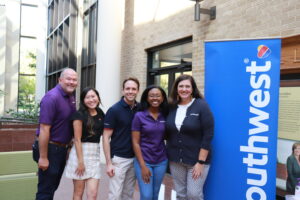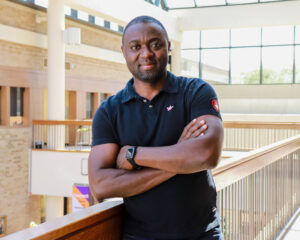by M. C. Jennings | Oct 20, 2022 | Academics, Accounting, Alumni Spotlight, COBA Faculty, COBA Staff, Current Students, Digital Entertainment Technology, Financial Management, Human Resource Management, Management, Management Information Systems, Marketing, Placement stories, Professional Development, School of Information Technology and Computing, Uncategorized

COBA Alums who work at Southwest Airlines recently came to discuss internship opportunities at the company with COBA students. Pictured from left to right are Chris Grubbs (’95), Kristy Ng (’20), Baron Smith (’09), Bethani Culpepper (’19), and Katie Coldwell (’00).
Written by special contributor Lance Fleming
When the College of Business Administration (COBA) unveiled the most significant changes to its curricula in decades, one area of great emphasis was professional development. Those studying the updates and later making the recommendations believed a professional internship would help make COBA students more well-rounded prospective employees when they left ACU.
As Dr. Brad Crisp, the Dean of the College of Business Administration said recently, “… we are placing greater emphasis on professional development by requiring a professional internship in management, marketing, and information systems and offering an internship as an option for accounting and finance majors.”
As the person serving as the director of professional development and internships for COBA, Jasmine McCabe-Gossett said the new emphasis on internships will help make students better equipped to handle real-world practices that they will face when they begin working full-time.
“Students need to take advantage of the unique timing internships can offer,” said McCabe-Gossett, who is in her first year as the Professional Development and Internship Director for COBA. “Students have the distinct opportunity to apply what can feel like abstract theories and case studies to the real world. Internships are insulated and allow students to practice in an environment designed for them to ask questions and fail, whereas, post-graduate opportunities can be far less forgiving.”
first year as the Professional Development and Internship Director for COBA. “Students have the distinct opportunity to apply what can feel like abstract theories and case studies to the real world. Internships are insulated and allow students to practice in an environment designed for them to ask questions and fail, whereas, post-graduate opportunities can be far less forgiving.”
Tim Johnston, the Assistant Dean for COBA, said a student who participates in an internship program in college will have a distinct advantage over students who don’t take advantage of those programs.
“Many years ago, with the contraction of the economy, many students were entering college without a lot of summer work experience,” Johnston said. “One of the top qualities all employers like to access is work ethic. Without a lot of work experience, it was difficult to feel confident about a student’s ability to dig-in and work hard. Many large organizations started internship programs.

“These programs typically run for 12 weeks during the summer,” he said. “Most are paid and it’s a way for a company to have a long and intense look at the candidates. Many companies only offer full-time opportunities to those students who have completed an internship with their organization. So for many large firms, this is the path into their company.”
When a student is looking for an internship, COBA Associate Dean Andy Little said one thing stands above all when he advises a student on a potential position.
“Fit,” he said succinctly. “In other words, does this organization fit your values and the goals you have set for yourself? Will you get practical experience? What kind of people work there? Is it an industry or market segment that you would like to start your career in?”
McCabe-Gossett agrees that finding an internship in a potential career field is an essential part of finding the right landing spot.
“I encourage students to focus on finding an internship in the industry they imagine as their future career,” she said. “Doing so will allow them to fully immerse themselves so they can determine whether or not their dream industry aligns with their values, work style, etc.”
said. “Doing so will allow them to fully immerse themselves so they can determine whether or not their dream industry aligns with their values, work style, etc.”
The National Association of Colleges and Employers has surveyed employers and determined the following qualities are most important to the potential employers surveyed. In order of importance, those qualities are:
- Problem-solving (critical thinking)
- Teamwork / collaboration
- Professionalism / work ethic
- Verbal and written communication skills
- Digital technology capabilities
- Leadership
- Global / multicultural fluency
“We want our students to demonstrate these competencies and reflect on their current areas of strength and areas where growth is needed,” Johnston said. “Their internship manager completes a formal evaluation that provides feedback on these key qualities.
“Another key advantage we are looking to provide for ACU students is an opportunity to intern with ACU alumni,” he said. “Our alumni teach students how professional excellence provides another avenue to honor God, as we serve in the marketplace.”
If you’d like to know more about internships with COBA, as either an employer or a student, email coba@acu.edu.
by M. C. Jennings | Oct 12, 2022 | Academics, Accounting, COBA Faculty, College Decisions, Current Students, Economics, Faith Infusion, Financial Management, Human Resource Management, International Business, Management, Management Information Systems, Marketing, Professional Development, Uncategorized
Written by special contributor Lance Fleming
The College of Business Administration (COBA) recently undertook what Dr. Brad Crisp considers “the most significant change to business curricula at ACU in at least three decades” with revisions to the Bachelor of Business Administration (BBA) majors.
significant change to business curricula at ACU in at least three decades” with revisions to the Bachelor of Business Administration (BBA) majors.
Those changes include updates to the core requirements for all business majors and to the major requirements for each business major, including an analytics track available within each major. The process that was undertaken was extensive and lasted a few years, including input from the COBA Dean’s Council, Visiting Committees, and other external stakeholders.
The members of each of those committees and groups were looking at in-depth benchmarking, analysis, and solution alternatives identified by the BBA Task Force. Those committees undertook extensive discussions on a wide range of proposals from the faculty task force, which was formed in early 2019 and delivered its recommendations later that fall. After the committees did their work, the changes were approved last spring by faculty and administrators at all levels of the university.
The goal of the core revision largely focused on faith and ethics, analytics and technology, and professional development.
“Faith and ethics are central to our identity as a Christian university,” said Dr. Crisp, the Dean of the College of Business Administration, “and we added some ethics content to a required business law course. All business majors will now take a two-course sequence in analytics and can choose a nine-hour or more track in analytics. Finally, we are placing greater emphasis on professional development by requiring a professional internship in management, marketing, and information systems and offering an internship as an option for accounting and finance majors.”

Photo by Jeremy Enlow
Those recommendations and changes are part of COBA keeping up with the pace of change that is currently being seen in the business world, said Andy Little, associate dean for COBA and associate professor of Business Law.
“The pace of change in the business world – and society in general – necessitates some level of change in two dimensions: first within a specific course, faculty need to stay up to date with new developments; and second, from time to time, the curriculum in general needs to be evaluated and potentially updated,” Little said. “It’s easy for most faculty to update specific courses on a regular basis. I’ve added three new readings to my introductory law class, all of which deal with recent developments in the legislature.
“Maybe more clearly, a course like Digital Marketing requires near-constant revision, just to keep up with all the changes in how people and companies use platforms to market products and services,” he said. “To a certain extent, the velocity of change works in favor of a stable curriculum: foundational subjects like Accounting, Economics, and Statistics need to be included in every iteration of a core curriculum over time because those are the building blocks on which much of the business enterprise rests.”
Every major was reviewed and now has more market aligned pathways giving students more direction and professional guidance as they look toward their future profession. As the business world evolves, COBA is continually looking for ways to prepare students both inside and outside of the classroom. We do this through holistic student development, offering foundational business courses and major specific tracks, and including ethics in our offerings. This combination helps us strive to produce graduates who honor God and bless the world.
To learn more about the College of Business at ACU, click here.
by M. C. Jennings | Sep 6, 2022 | Academics, COBA Faculty, College Decisions, Faculty Testimonials, Faith Infusion, Management Information Systems, Uncategorized
 Written by special contributor Lance Fleming
Written by special contributor Lance Fleming
Growing up in Cameroon as the oldest child in a family of five, Dr. Joseph Manga never imagined where his life would take him.
Four different universities for undergraduate, graduate, and doctoral work, as well as tutoring and teaching experience, have all been part of the experience. And this past summer, it led him to Abilene Christian University and the College of Business Administration where he is teaching Management Information Systems.
Manga now joins the full-time faculty as a tenure-track assistant professor of Information
Systems and Management Science. None of this was what Manga expected to be his life’s work
while living in Cameroon. But as he would come to learn, God had other plans for his life.
“As we know, many may be the plans in a man’s heart, but the Lord determines the end,” he
continued. “I began with Mathematics, did a little bit of Computer Science, and then moved on
to business (MIS). This all worked out because I didn’t just want to be crunching numbers and
not know how to interpret them. So, I developed my love for learning from my personal
experience. As an introvert, I thought that doing something that would keep me from talking to
people would be great. That’s why I’m so passionate about research. That was all my plan. But
God’s plan was to send me to love and talk to people.”
Knowing all of that, it still took a chance conversation with a friend that pointed him toward
teaching and meeting the needs of young people.
“I vividly remember sometime in 1998 a friend walked up to me and said, ‘I see you as a
teacher,’ “ Manga said. “I didn’t want to hear that because I never wanted to teach, partly
because of my personality. But as I applied myself to learning, I realized there is more to
teaching than just transferring knowledge. It involves mentoring and discipleship, which are
godly assignments that we are called to fulfill. I believe that teaching brings transformation to
many when it is done in a godly way. That’s why I’m excited to be part of a family and
community that focus on raising a holistic generation in terms of spiritual academic formation,
who will, in turn, move on to serve and transform their world.”
He’s also motivated by the memory of his father, who passed away last January. Manga is the
first person in his family to attain a doctorate, and he attributes his decision to reach the
highest level of education to his father, who worked as a janitor at the university Manga
attended in Cameroon.
“My dad was a strong motivator and proponent for pursuing education, which is a passion for
me now – to see young people educated,” Manga said. “As a janitor, my dad would wake up
very early to go clean the classrooms before students started classes. I still remember one
instance when my dad’s supervisor verbally demeaned him, and I felt bad. But I decided to get
to the highest level of education and use it to honor the janitors who keep our work
environment clean. It was an awful life experience, but it served as a challenge to the
educational experience I have today, which I see as a blessing.”
Manga earned his Bachelor of Science from the University of Buea in Cameroon before earning a
Master’s of Business Administration from Midwestern State University in 2014, a Master of
Science in Management Information Systems from the University of North Texas in 2018, and
finally his Ph.D., in Business Administration from the University of Texas-Rio Grande Valley in
2022.
During all of his academic work, Manga has continued his research in several different areas of
management information systems, technology, information security policy compliance,
business analytics, health information technology, cyber security, and many others.
“Research is a passion,” Manga said. It’s one way to apply my background knowledge in
Mathematics, which is problem-solving. Identifying problems and looking for ways to provide
solutions to these problems is what drives me into research. Finally, I see research as making a
little contribution to academia and giving back to the community.”
Manga has also worked as a Men’s Ministry Coordinator at Abundant Grace Community Church
in Edinburg and as a tutor while in Wichita Falls. And he’s kept up with a family that includes
wife Clarise and four children: Abijoy (9), Solien-Pearl (6), Zoe-Ann (5), and Joe-Praise (4), all of
whom he calls “inquisitive disciples.”
And now the family of six has found its way to Abilene and ACU where Manga is ready and
willing to serve as God leads.
“I am passionate to serve, especially in an environment that aligns with one’s beliefs and
values,” he said. “When the opportunity opened to be part of a culture and institution that
trains godly business leaders in whatever capacity they find themselves, I was glad to jump on
it. God opened this door and I love to follow His lead.”

 first year as the Professional Development and Internship Director for COBA. “Students have the distinct opportunity to apply what can feel like abstract theories and case studies to the real world. Internships are insulated and allow students to practice in an environment designed for them to ask questions and fail, whereas, post-graduate opportunities can be far less forgiving.”
first year as the Professional Development and Internship Director for COBA. “Students have the distinct opportunity to apply what can feel like abstract theories and case studies to the real world. Internships are insulated and allow students to practice in an environment designed for them to ask questions and fail, whereas, post-graduate opportunities can be far less forgiving.”
 said. “Doing so will allow them to fully immerse themselves so they can determine whether or not their dream industry aligns with their values, work style, etc.”
said. “Doing so will allow them to fully immerse themselves so they can determine whether or not their dream industry aligns with their values, work style, etc.” significant change to business curricula at ACU in at least three decades” with revisions to the Bachelor of Business Administration (BBA) majors.
significant change to business curricula at ACU in at least three decades” with revisions to the Bachelor of Business Administration (BBA) majors.
 Written by special contributor Lance Fleming
Written by special contributor Lance Fleming